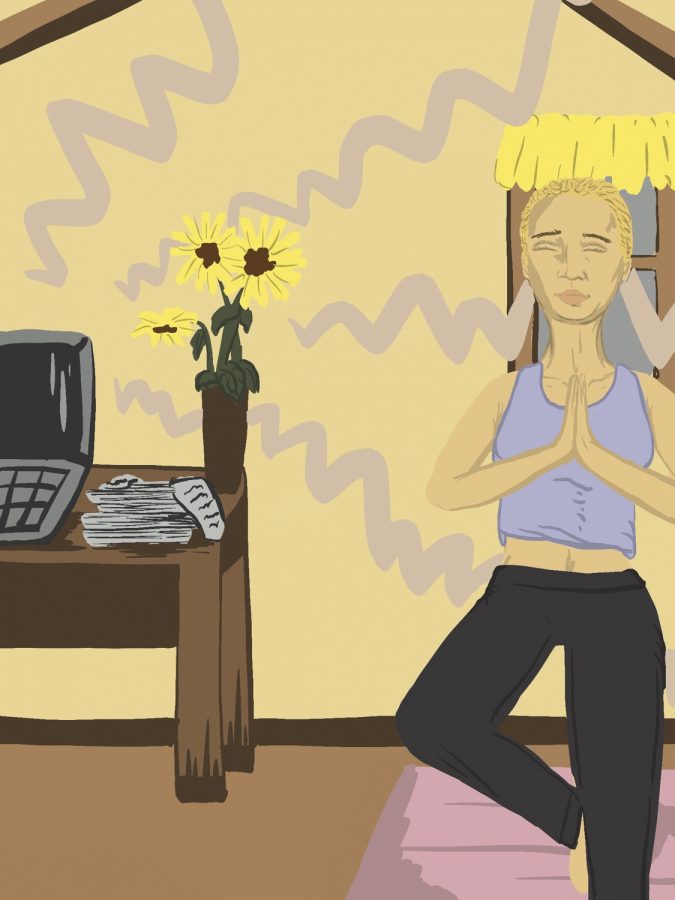Ways to improve your mental health amid the covid-19 pandemic
Tips to keep your body and mind healthy this semester
Making healthy habits can be the key to helping your mental health and staying positive this semester.
October 8, 2020
Many people are experiencing negative impacts on their mental health because of COVID-19, so it is more important than ever to make time to relax and de-stress this semester.
Even if you do not feel you have time to take a break, your mental health and work-life balance will benefit from a few practices you can easily implement — and I’m not talking about putting on a face mask and watching your favorite show even though those are fun.
Get your body moving
Most people think about yoga or low-intensity workouts for mental health benefits, but high-intensity workouts can also be beneficial because they release stress-reducing hormones called endorphins, said Joseph Martin, UREC group fitness and instruction coordinator.
The American College of Sports Medicine recommends adults spend time doing aerobic exercise at least three to five days a week, depending on the intensity of the workout.
Mobility and flexibility based workouts are important for people who work from home and spend a lot of time sitting, Martin said. Even if you don’t have time for a full 20-30 minute workout, taking a few minutes to stretch is an important part of a healthy working routine.
UREC is offering both in-person and online fitness classes this semester and registration is currently open for session two. All online classes are free, he said.
For people who are new to fitness, mind and body yoga is a good place to start, Martin said.
Organize your space and schedule
Whether you are a bare-bones minimalist or lover of “stuff,” it feels good to have a clean room or workspace. Not everyone thrives in a clean work environment, but cleaning can make you feel you accomplished something, albeit minimal.
Take a few minutes out of your day to pick the clothes up from your bedroom floor, wipe down the bathroom counter or organize the textbooks on your desk.
Don’t use cleaning as a way to procrastinate, but keep your space tidy if you know it helps your brain focus on the task at hand.
If you own so many things that you have no idea where to start cleaning, I recommend Marie Kondo’s book “The Life-Changing Magic of Tidying Up.” You don’t have to do a complete overhaul of your home to feel better about life, but you may as well if you have the time.
Sometimes a messy schedule can feel just as suffocating as a messy room. Take five minutes in the morning — it can even be while you eat breakfast — to identify what you need to accomplish that day. A planner (or a complex system of whiteboards and sticky notes) can be useful for this practice.
Monitor time online
Everything is online these days: school, work, meetings, friendships, TV, social media. Don’t discount the effect of cutting your screen time on your mental health and overall productivity.
There are plenty of apps you can use to track how much time you spend on your phone each day if your phone does not track it automatically. Depending on what you use it for, your usage will vary, but less is always more with cell phones.
If you know getting to sleep is difficult when your phone is next to you, consider putting your phone across the room or outside your bedroom entirely.
Netflix has a new docudrama called “The Social Dilemma” if you want to scare yourself out of using electronic devices entirely.
Practice mindfulness
Mindfulness is paying attention to what is happening in the present moment, Martin said. It can bring people a sense of peace or stress release.
Practices with mindfulness can, but don’t always, involve meditation, Martin said. You can also be aware of the sensations your body is feeling, such as the feel of the carpet under your feet or the chair you are sitting in.
Savoring your food, being engaged in social interactions and participating in your favorite hobbies can all be components of mindfulness that bring about stress release, he said.
Mental health support services
These practices are great if you are a stressed-out college student or a workaholic who needs a break. However, if you are seriously struggling during the pandemic, don’t expect these to be a panacea for what you are experiencing.
Seek help from mental health professionals if your stress or anxiety has become hard to cope with. You are not alone and there are people who can help you.
The Cougar Health Services website has resources for mental health, such as Counseling and Psychological Services, and a new webinar series called Real Talk Thursdays.






















